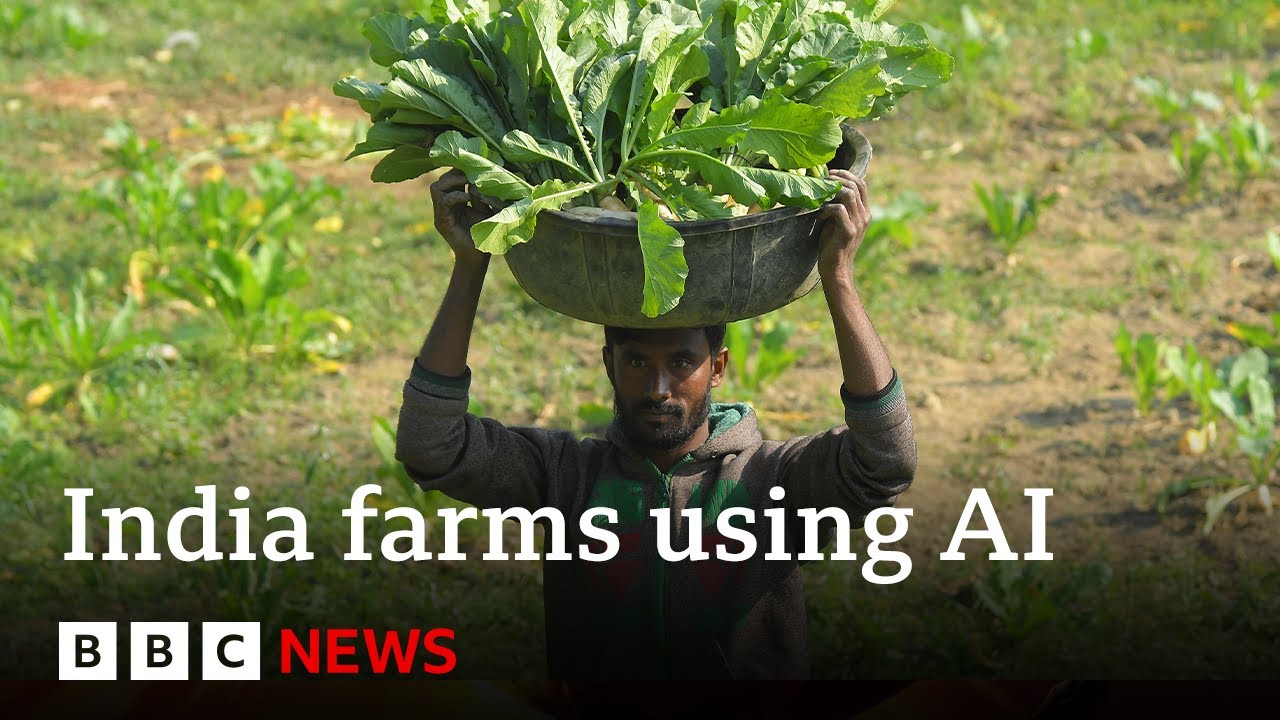India has long relied on traditional methods of agriculture, but with a rapidly growing population of 1.4 billion people dependent on the crops produced, farmers are turning to technology for increased productivity and profitability. One example is the use of sensor devices on a vineyard to monitor weather and soil conditions, with artificial intelligence then determining when to water the crops, add fertilizer, and combat pests. This innovative approach has already resulted in significant water savings and improved efficiency. However, while AI-driven agriculture holds the promise of increased profitability, it will require substantial time and investment to reach the majority of India’s farmers.
With 50% of the Indian workforce employed in agriculture, the shift towards technology is becoming increasingly important. By implementing AI and sensor technology, farmers can make informed decisions and improve productivity, ultimately boosting their profits. Additionally, AI-powered robots equipped with precision cameras are being used to scan the ground and accurately target pesticide spraying, leading to significant savings and enhanced rural digital connectivity. Although there is still a long way to go, the combination of government support, public-private partnerships, and increased investment in AI-driven agriculture has the potential to revolutionize farming practices in India, ensuring a more sustainable and efficient future for the agricultural sector.
Traditional methods of agriculture
Dependence on traditional methods
For generations, Indian farmers have relied on traditional methods of agriculture to cultivate their crops. These methods have been passed down through the generations and have been ingrained in the culture of farming in India. Traditions such as sowing and tilling the land, managing soil health, and dealing with pests and diseases have played a crucial role in crop production.
Challenges and limitations of traditional methods
While traditional methods have their merits, they also come with their fair share of challenges and limitations. One of the main challenges faced by farmers is the dependence on unpredictable weather patterns. Traditional farmers heavily rely on monsoons for water supply, and any deviation from the expected rainfall can result in poor crop yields.
Additionally, traditional farming methods often involve manual labor, which can be labor-intensive and time-consuming. Farmers need to spend long hours in the fields, tilling the land, manually watering the crops, and dealing with pests and diseases. This not only puts a strain on their physical well-being but also limits their ability to expand their farming operations.
Introduction of technology in Indian farming
Need for technological interventions
With an ever-growing population and increasing demands for food, there is a pressing need for technological interventions in Indian farming. Traditional methods alone may not be sufficient to meet the growing demands and ensure food security for the nation. Technology can help farmers increase their productivity, optimize resource usage, and improve overall profitability.
Advantages of technology in agriculture
The introduction of technology in agriculture brings numerous advantages for Indian farmers. Firstly, it can enhance efficiency by automating and streamlining various farming processes. This can free up time for farmers to focus on other aspects of their operations and increase productivity. Secondly, technology can provide valuable data and analytics that enable farmers to make informed decisions regarding crop management, resource allocation, and pest control. Lastly, technology can contribute to sustainable farming practices by optimizing water usage, reducing chemical inputs, and minimizing environmental impact.

Artificial Intelligence (AI) in farming
Overview of AI in agriculture
Artificial intelligence (AI) has emerged as a game-changer in various industries, and agriculture is no exception. AI in farming refers to the integration of advanced technologies such as machine learning, computer vision, and data analytics to make informed decisions and optimize farming processes. By analyzing vast amounts of data, AI can provide valuable insights and recommendations to farmers, thereby improving crop quality, yield, and profitability.
Benefits of AI in farming
The adoption of AI in farming brings numerous benefits for Indian farmers. Firstly, AI-powered systems can monitor weather conditions and soil health in real-time, providing farmers with accurate information for decision-making. This enables farmers to optimize irrigation schedules, apply fertilizers at the right time and in the right quantity, and effectively manage pest infestations. Secondly, AI can improve resource efficiency by optimizing water usage, reducing wastage, and minimizing environmental impact. Lastly, AI can enhance crop quality and yield by enabling precision farming techniques, such as targeted spraying and monitoring plant health on a micro-level.
AI-powered sensor devices
Monitoring weather and soil health
AI-powered sensor devices play a crucial role in monitoring weather conditions and soil health on farms. These devices are equipped with various sensors and data collection mechanisms that can measure parameters such as temperature, humidity, rainfall, and soil moisture. By collecting and analyzing this data, AI algorithms can provide real-time insights into crop health, enabling farmers to make timely decisions regarding irrigation, pest management, and fertilizer application.
Optimizing water usage
One of the key challenges faced by Indian farmers is water scarcity and the need for efficient water management. AI-powered sensor devices can help optimize water usage by monitoring soil moisture levels and providing timely recommendations on irrigation schedules. By matching water supply with crop demand, farmers can ensure efficient water usage, thereby conserving precious water resources and maximizing crop productivity.
Managing fertilization and pest control
AI-powered sensor devices can also assist farmers in managing fertilization and pest control. By continuously monitoring crop health and pest activity, these devices can detect early signs of infestations and diseases. They can then provide real-time recommendations on the appropriate timing and dosage of fertilizers and pesticides, minimizing chemical inputs and reducing the risk of crop damage.

Case study: Vineyard using AI technology
Implementation of AI in a vineyard
One example of the successful implementation of AI technology in Indian farming is seen in a vineyard. Sensor devices are used to monitor weather conditions, soil health, and crop health in real-time. The data collected by these devices is then fed into AI algorithms, which analyze the data and provide actionable insights to the farmer.
Impact of AI on water usage
The implementation of AI technology in the vineyard has had a significant impact on water usage. By using AI data and recommendations, the farmer is able to irrigate the crops only at crucial stages, resulting in a 50% reduction in water usage compared to previous methods. This not only helps conserve water resources but also leads to cost savings for the farmer.
Increase in productivity and profitability
The use of AI technology has also led to an increase in productivity and profitability in the vineyard. By optimizing irrigation schedules, managing pest control, and providing timely recommendations, AI has helped the farmer achieve a near 25% boost in productivity. This has not only increased the yield of crops like grapes and guavas but has also improved the overall profitability of the vineyard.
Role of AI-powered robots
Weeding out inefficiencies in agricultural practices
AI-powered robots are revolutionizing agricultural practices by eliminating inefficiencies. These robots are equipped with precision cameras that scan the ground in real-time, allowing them to identify and selectively target weeds. By precisely spraying only on the plants and avoiding unnecessary spraying, these robots can significantly reduce the amount of herbicides used and minimize damage to crops.
Precision spraying based on plant-level decision making
Traditional spraying methods in India are often done on an acre-level, resulting in the waste of resources and potential harm to non-target crops. AI-powered robots, on the other hand, enable precision spraying based on plant-level decision making. By analyzing plant health data and identifying areas of concern, these robots can deliver targeted sprays only where needed, resulting in substantial savings and improved crop health.

Government support for Agri Tech startups
Rural digital connectivity
The Indian government has recognized the potential of Agri Tech startups and has taken several initiatives to support their growth. One such initiative is the promotion of rural digital connectivity. By providing internet access to rural areas, the government aims to bridge the digital divide and enable farmers to access the latest technological advancements in agriculture.
Government initiatives and funding
The government has also introduced various initiatives and funding schemes to support Agri Tech startups. These initiatives provide financial assistance, technical support, and infrastructure development for startups working on innovative solutions for the agriculture sector. This support encourages entrepreneurship and innovation in the field of agriculture and ensures that promising technologies are given the opportunity to flourish.
Encouraging public-private partnerships
To further promote the adoption of AI technology in Indian farming, the government is encouraging public-private partnerships. By fostering collaborations between government agencies, research institutions, and private companies, the government aims to create an ecosystem that facilitates the development, deployment, and scaling of AI-driven agricultural solutions. These partnerships ensure that technological advancements reach farmers on the ground and contribute to the modernization of Indian agriculture.
Challenges and limitations of AI in Indian farming
Low adoption rate of technology in farming
Despite the numerous benefits of AI in farming, the adoption rate of technology in Indian agriculture remains relatively low. Only 2% of cultivators currently use tech-based solutions in their farming practices. This low adoption rate can be attributed to various factors, including limited awareness, lack of access to resources and infrastructure, and resistance to change.
Infrastructure and financial constraints
The adoption of AI technology in farming requires robust infrastructure and financial resources. Many farmers in India face constraints in terms of access to reliable electricity, internet connectivity, and storage facilities. Additionally, the high costs associated with implementing AI-driven solutions, such as purchasing sensor devices or robots, can be a barrier for small-scale farmers who may not have the financial means to invest in such technologies.
Need for time and investment for widespread adoption
Widespread adoption of AI technology in Indian farming requires time and investment. Farmers need to be educated about the benefits and potential of AI, and training programs need to be implemented to equip them with the necessary skills for technology adoption. Moreover, the government and private sector need to invest in research and development, infrastructure development, and financial support to make AI-driven agriculture accessible and affordable for all farmers.

The future of AI-driven agriculture in India
Promising profitability in farming
The future of AI-driven agriculture in India holds promising prospects for profitability in farming. By leveraging AI technology, farmers can optimize their resource usage, increase crop yields, and improve overall productivity. This can lead to higher profitability and better livelihoods for farmers, ultimately contributing to the economic growth of rural communities.
Importance of continued investment and support
To unlock the full potential of AI-driven agriculture, continued investment and support are crucial. The government, private sector, and research institutions need to collaborate to develop innovative solutions, improve infrastructure, and provide financial assistance to farmers. This sustained investment and support will enable the widespread adoption of AI technology and ensure that all farmers can benefit from its advantages.
Potential for improving yield and livelihoods
AI-driven agriculture has the potential to significantly improve crop yields and livelihoods in India. By leveraging advanced technologies and data-driven decision-making, farmers can overcome traditional limitations and maximize their agricultural outputs. This can lead to improved food security, increased income for farmers, and a more sustainable agricultural sector.
Conclusion
Summary of the impact of AI in Indian farming
The integration of AI technology in Indian farming has the potential to revolutionize the agricultural sector. By leveraging AI-powered sensor devices and robots, farmers can optimize their resource usage, improve crop management, and increase productivity. The implementation of AI technology in a vineyard has already showcased significant benefits, such as water savings and increased profitability.
Emerging opportunities and challenges
While AI-driven agriculture presents emerging opportunities, it also comes with its fair share of challenges. Low adoption rates, infrastructure constraints, and the need for time and investment are some of the challenges that need to be addressed. However, with continued investment, support, and government initiatives, AI-driven agriculture has the potential to transform Indian farming and pave the way for a more efficient, productive, and profitable future.
In conclusion, the introduction of AI in Indian farming holds the promise of revolutionizing the agricultural sector. By harnessing the power of technology, farmers can overcome traditional limitations, optimize resource usage, and improve overall productivity. The future of AI-driven agriculture in India looks promising, but it will require continued investment, support, and collaboration to realize its full potential and bring about sustainable growth in the sector.







Leave a Reply